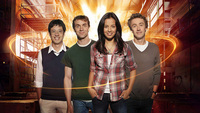Bang Goes The Theory Live heads back on the road

BBC One’s popular science series Bang Goes the Theory is back with more inspiring science feats, action-packed demonstrations and stunts to impress and amaze.
From insights into the behaviour of crowds and a pedal powered plane, to travel nightmares and DIY fuel, the new series gets off to an explosive start on BBC One on Monday 12 March. The team will also be asking whether dogs really are clever and taking a look at the safety of Wifi.
To accompany the TV series the presenters will be in Birmingham, Edinburgh, Sheffield and Poole with the Bang Goes The Theory Live Roadshow – which promises to be bigger and better than ever.
Viewers can join members of the team for a brand new show as they recreate some of the best stunts from the TV series and test, stretch and explode scientific theories live on stage. Science superstar and Bang ‘boffin’ Dr Yan Wong will be joined by presenters from the TV show Jem Stansfield, Liz Bonnin and Dallas Campbell for the live tour.
Presenter Liz Bonnin is a Biochemist and wild animal biologist with a passion for conservation and is excited to be back with the new BBC One series and this year’s live roadshow. She is also delighted that science is currently so popular and says: “long may it last!”
“Science helps us to understand how everything works and how to solve problems, and with the current environmental issues we are facing on this planet, it has never been more important. More than ever, we need to turn to science for sustainable, global solutions. Young people are inherently more curious about the world around them and are certainly very aware of green issues. They are the future and I hope that we play a small part in keeping that passion alive.
"I have had some amazing experiences with Bang these past three years – from visiting the Icelandic volcano and investigating the Gulf oil spill, to meeting the scientists at the cutting edge of their fields. But some of the most memorable moments are from the roadshows, when we meet people from all around the country. I'll never forget one particular girl who ran up to us and chatted excitedly about why she wanted to be a scientist. She had so much passion and ambition, at just eleven years of age, it warmed the cockles of my heart – I love being part of something that encourages people like her.”
Fellow presenter Dallas Campbell says: “The roadshow is undoubtedly the highlight of the Bang calendar. It’s the time where we can let our hair down meeting the viewers who’ve made the TV show such a success. As well as the live show, which is always full of surprises, it’s wonderful to be able to talk about what we’ve been up to first hand, swap ideas, and let people get hands-on with some fantastic science for themselves.”
Over a quarter of a million people have already put science and technology to the test at the roadshows over the past three years.
BBC Learning Executive Andrew Tomlinson says: “The Bang Goes The Theory Live Roadshow is hugely popular every year and is one of our biggest events. It brings together the key science disciplines and allows visitors of all ages to get ‘hands on’ with science, and take part in science experiments.
“The roadshow is also a great opportunity for members of the public to ask the presenters challenging science questions in the Interactive Area, as well as trying some street science; learning about meteorology and presenting their own weather forecast. The roadshow includes an exciting live stage show - tickets are free with some available on the day, but it is very popular so it’s worth booking to avoid disappointment!”
The Bang Goes The Theory Interactive Area gives the public the chance to do their own experimenting and get hands on with the interactive exhibits. They can also pick up some science tricks to impress friends and family as the science buskers demonstrate the best of street science. You don’t need a ticket to enjoy the interactive area but for more details about how to apply for free tickets for the stage show go to bbc.co.uk/bang.
This year the BBC is working with a number of partners including the Society of Biology, Institute of Physics and Royal Society of Chemistry and there is also the opportunity to be part of a mass experiment with BBC Radio 4’s So You Want To Be A Scientist.

